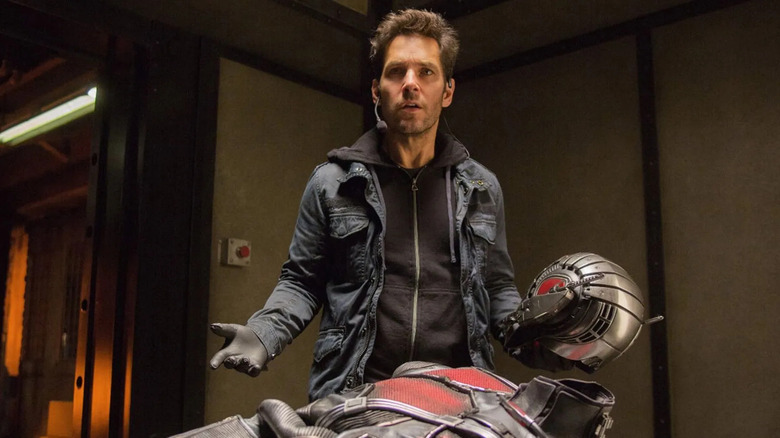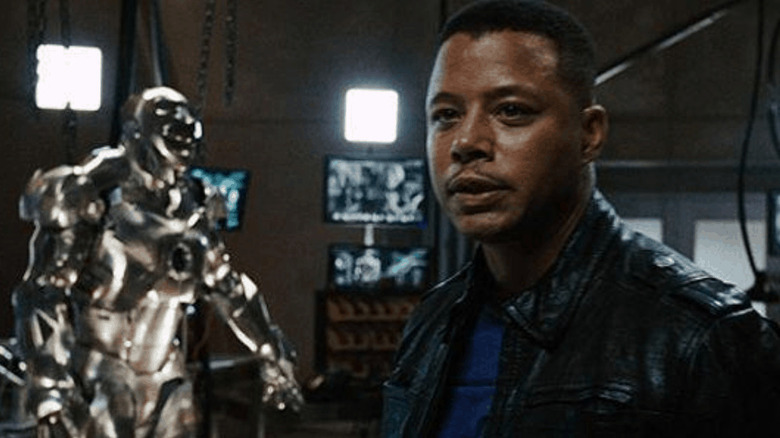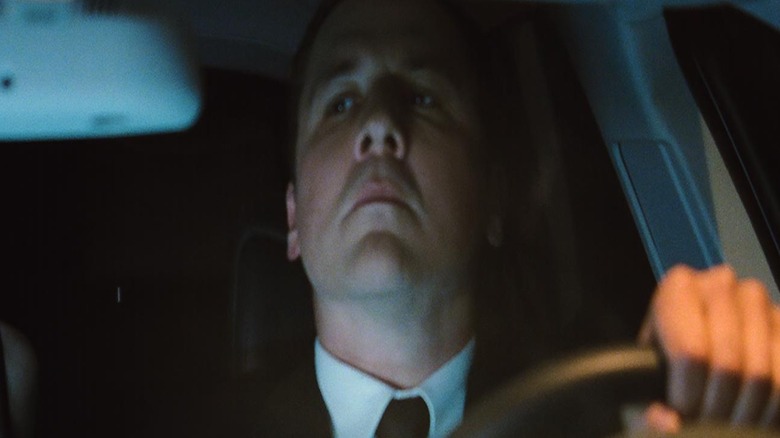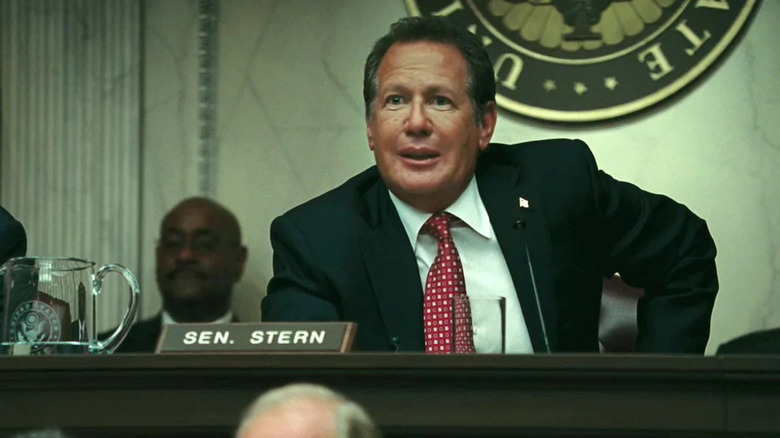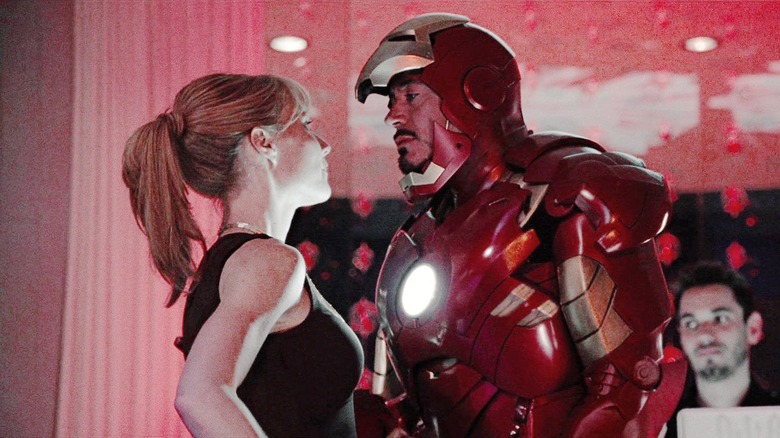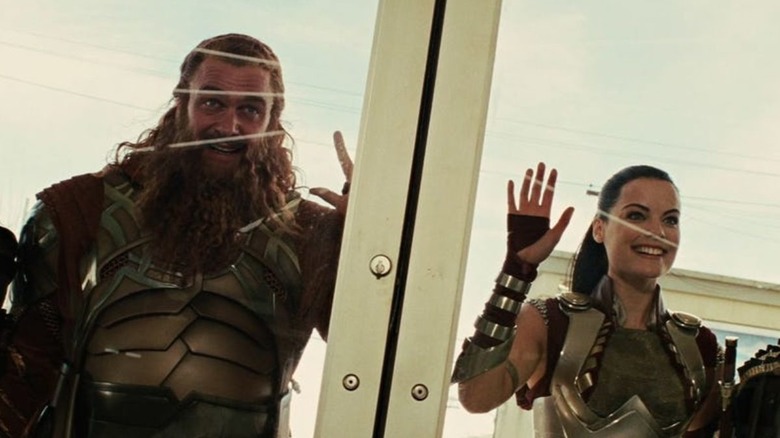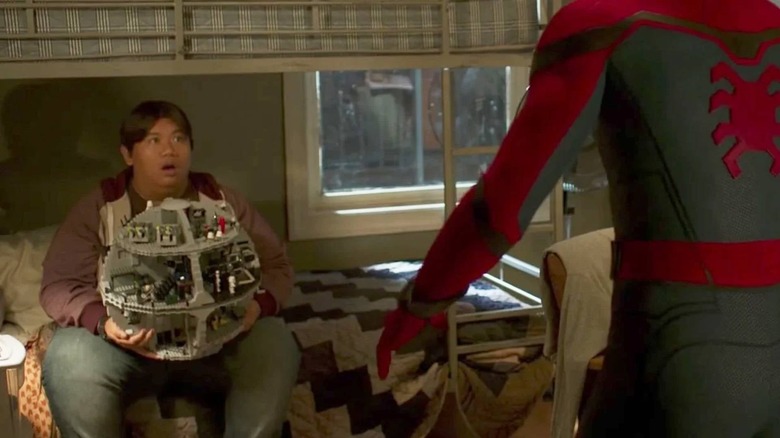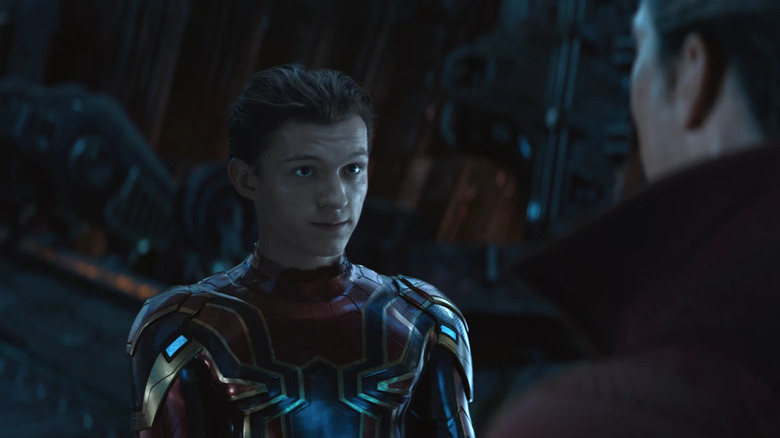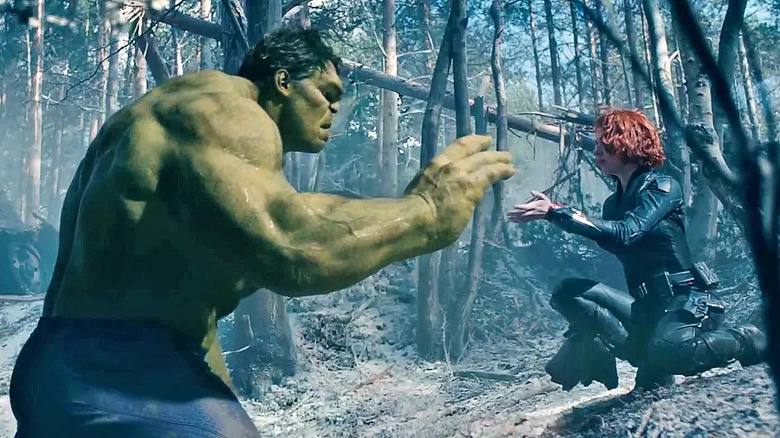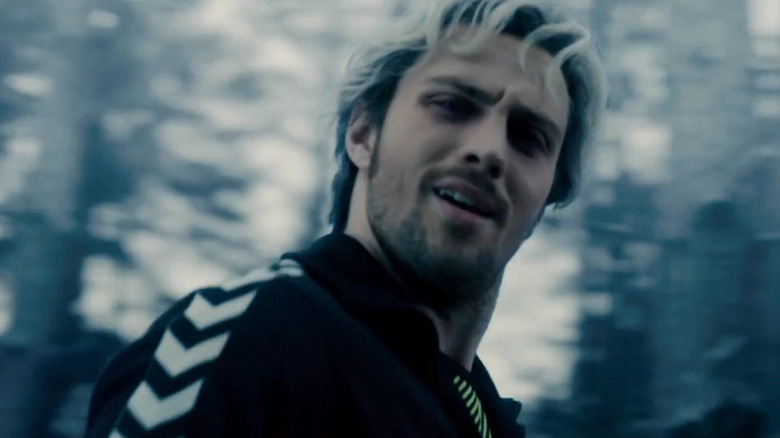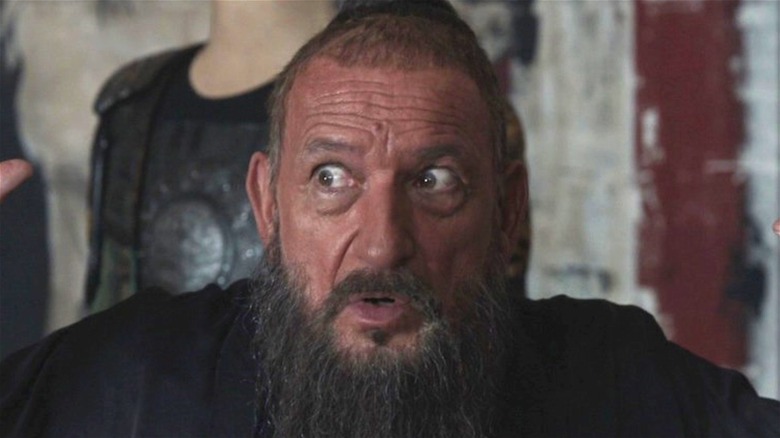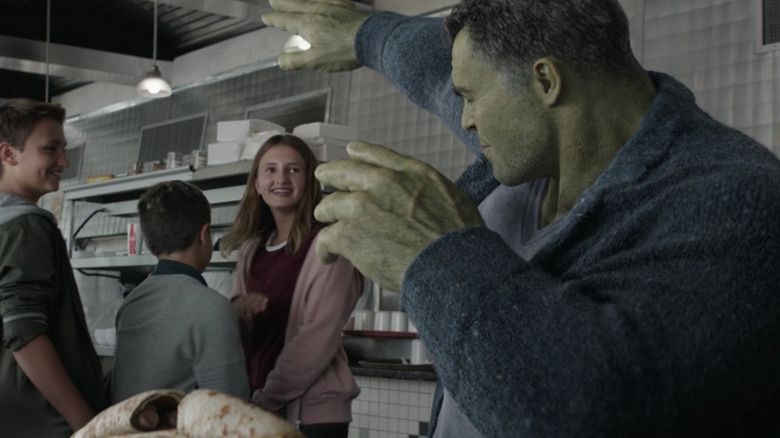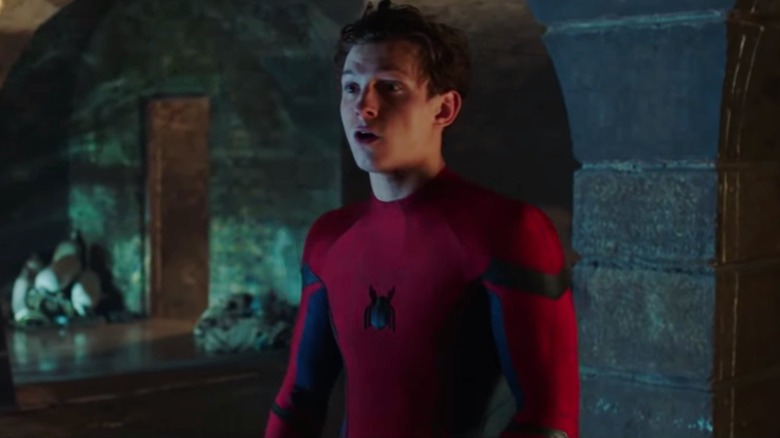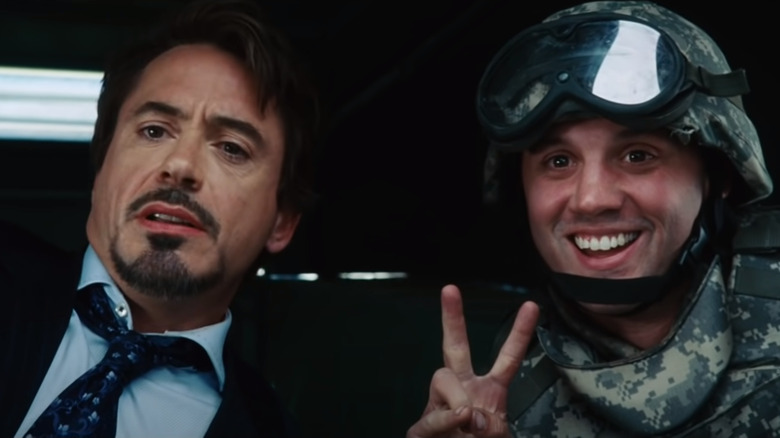MCU Jokes That Didn't Age Well
It can't be overstated how important humor is within the Marvel Cinematic Universe. The MCU is very complex and requires dedication from the viewers. Trying to figure out how each connected storyline relates to each other would feel like homework if the audience didn't have characters that they cared about. Thankfully, Kevin Feige and the creative forces at Marvel Studios have always nailed their casting choices, selecting actors that have a sense of humor. Marvel needed the audience to love the characters first and foremost, even if they didn't enjoy every single project they were in. If you love Chris Hemsworth's performance as Thor, you might be able to forgive him for making 2013' "Thor: The Dark World." "Iron Man 2" might seem like a bad movie to many, but that doesn't mean that Robert Downey Jr. isn't still great as Tony Stark.
The MCU's ability to poke fun at itself is instrumental to its success. One of the reasons that the DCEU never took off in the same way was the cold, humorless nature of the characters. The MCU has evolved significantly since the first "Iron Man" film was released in 2008. Some of the humor in the earlier MCU films now feels outdated, or sometimes the increasingly expansive nature of the franchise has also made some earlier jokes irrelevant. These MCU jokes haven't aged well at all.
Next Time, Baby — Iron Man (2008)
Like any expansive franchise, the Marvel Cinematic Universe hasn't stuck to every casting choice that was originally made. The most notable recasting was when Edward Norton decided to not reprise his role as Bruce Banner/The Incredible Hulk, and Mark Ruffalo was cast as his replacement in "The Avengers." Ultimately, it was a decision that benefited everyone. Norton's depiction of Banner wouldn't have fit the tone of "The Avengers," and Ruffalo was able to bring more depth to the character. A similar incident occurred within the "Iron Man" franchise.
Terrence Howard appears in the first "Iron Man" film as Colonel James Rhodes, but there were reportedly difficulties on set. According to Entertainment Weekly, tensions arose with director Jon Favreau during filming, with the director having to reshoot many of Howard's scenes. As a result, Marvel Studios offered him less money to reprise his role in "Iron Man 2." Howard decided to retire from the role, and Don Cheadle was cast in his place. During the end of "Iron Man," Rhodes notices a silver Iron Man suit, and jokes "next time, baby." This was a reference to the planned storyline in which Rhodes would become War Machine. However, when War Machine did appear in "Iron Man 2," it was Cheadle who was behind the suit. Howard never got the chance to don the armor for himself.
Happy Watches Natasha Changing — Iron Man 2 (2010)
The crass sexual humor in the first two "Iron Man" films is almost completely absent from the modern MCU, as Disney has definitely pushed the franchise in a more "family-friendly" direction. This makes the first two "Iron Man" films feel unique compared to the rest of the pack. However, that doesn't mean that humor should come at the sake of the characters' dignity.
While Scarlett Johansson's performance as Black Widow became one of the most iconic roles within the MCU, her first appearance in "Iron Man 2" was somewhat disappointing. While Black Widow was granted more agency in "The Avengers," she is the victim of casual sexist remarks from Tony throughout "Iron Man 2." When Tony first meets Natasha, he jokes that he "wants one." This uncomfortable joke doesn't hold up to how both characters have evolved. However, the most egregious example of sexism within the film is an extended sequence in which Black Widow changes clothes in the back of a car driven by Happy Hogan (Jon Favreau). Happy gets distracted while driving because he is trying to watch Black Widow in the backseat. These jokes are lazy, and they make Happy seem like a creep.
Everything With Gary Shandling — Iron Man 2 (2010)
"Iron Man 2" committed an egregious sin: wasting the talents of Garry Shandling. Undoubtedly one of the greatest comedians of all time, Shandling is remembered for his work on "The Larry Sanders Show," his appearances on "The Tonight Show," and his Showtime series "It's Garry Shandling's Show." It seemed like the MCU would be gaining a major addition when Shandling was cast in the second "Iron Man," but that film did not take advantage of his extensive experience.
Shandling appears as Senator Stern, a callous politician who questions Tony's motivations. Stern presides over a Senate Armed Services Committee in Washington, D.C. that Tony attends. Stern characterizes everything that Tony has done as irresponsible, painting him as a selfish jerk. Shandling doesn't get to shine in this scene, Tony just mocks him. Outside of being plain unfunny, the scene doesn't take advantage of what could have been an interesting commentary on the role of superheroes within the military. Shandling returned to the MCU in "Captain America: The Winter Soldier," where it is revealed that Senator Stern is secretly a member of HYDRA, which at least helps explain why he was so cruel towards Tony in "Iron Man 2." It no longer made sense for Stern to be such a comedic oaf: If he was a Senator under HYDRA's control, wouldn't he have better things to do than chide Tony in a committee meeting?
Tony's Drunk Party — Iron Man 2 (2010)
The primary reason that the MCU has been so successful is the likability of the characters. There's no performance in the MCU that is more critical to its success than Robert Downey Jr.'s role as Tony Stark. Without Downey Jr.'s charisma, the MCU would simply not exist. However, "Iron Man 2" does almost everything possible to ruin Tony as a character. Instead of the inspiring hero that Tony becomes at the end of the first film, he acts like a selfish jerk throughout the sequel, acting carelessly towards everyone around him. Despite growing close to Pepper Potts (Gwyneth Paltrow) at the end of the first film, Tony basically ignores her throughout the second one, especially during an extended party sequence where he gets drunk and shows off his Iron Man suit. The situation gets so bad that Rhodes has to intervene.
If we learned anything about Tony from the first film it's that he has learned the consequences of misusing technology. It doesn't make sense for him to be so irresponsible with the Iron Man suit. The scene is also uncomfortable because of the jokes about Tony's struggles with alcoholism. Considering how respectfully "Iron Man 3" deals with Tony's mental health, this scene sticks out like a sore thumb.
Thor's Friends Mistaken For Cosplayers — Thor (2011)
One of the reasons that the MCU has remained so popular is the way that it accepts its fans. Instead of discrediting the passion of a dedicated fanbase, the MCU offers a positive representation of fan conventions, fan culture, and cosplayers, which helps form a bond between the audience and the universe. MCU fans get to see in-universe fans reacting to the characters in the same way that they would. In recent years, cosplay has become a more important part of the MCU. In "Hawkeye," there is an extended sequence in which Clint Barton (Jeremy Renner) participates in a live-action role-playing game. The scene in "Hawkeye" is funny, but it doesn't stereotype cosplayers. The debut episode of "Ms. Marvel" centers around a cosplay convention. These shows only make an odd joke in the first "Thor" film stick out even more.
When Lady Sif (Jamie Alexander), Volstagg (Ray Stevenson), Fandral (Josh Dallas), and Hogun (Tadanobu Asano) arrive on Earth, Agent Garrett (Dale Godboldo) makes a joke about the characters attending a local Renaissance Faire. He goes on to label them "Xena, Jackie Chan, and Robin Hood." This is just an unfunny joke at the expense of cosplayers. Also, if Garrett was looking to make a timely popular culture reference, couldn't he have come up with names that were more relevant than Xena, Jackie Chan, and Robin Hood?
Peter And Ned's LEGO Death Star — Spider-Man: Homecoming (2017)
It's no secret that the Walt Disney Company presides over the future of both Marvel and Lucasfilm. If you need evidence as to how much Disney has taken advantage of its Marvel and Star Wars properties, just skim through Disney+ to see all the available content. Disney has extensive plans for the future of both franchises. As a result of their mutual popularity and the crossover fanbase, there have been many "Star Wars" references throughout the MCU. There's actually a genuinely funny moment in "Captain America: Civil War" when Peter Parker (Tom Holland) refers to "The Empire Strikes Back" as a "really old movie."
However, the Star Wars callbacks in "Spider-Man: Homecoming" overstay their welcome. While Peter's passing comment about "The Empire Strikes Back" in "Captain America: Civil War" established that he was a Star Wars fan, "Spider-Man: Homecoming" makes it seem like building a LEGO Death Star is the most important thing in his life. Peter and his best friend Ned (Jacob Batalon) obsessively talk about the LEGO set. This just feels like an exaggerated joke that advertises an available product. The cross-promotion feels less natural and more cynical. At this point in time, both Star Wars and Marvel are very oversaturated, so this whole subplot in "Spider-Man: Homecoming" hasn't aged well.
Peter References Aliens — Avengers: Infinity War (2018)
Peter Parker makes another reference to an "old movie" in "Avengers: Infinity War" when he brings up James Cameron's 1986 classic "Aliens." This callback may have seemed amusing, but if you're binging the entire MCU it just feels like it is repeating the same joke that was already made about "The Empire Strikes Back" in "Captain America: Civil War." At this point, Peter's references to movies from the 1980s are no longer funny. The scene also brings up an odd logical error, which has been a consistent problem for the MCU when it makes pop culture references. Sigourney Weaver, the star of "Aliens," appears in the MCU as Alexandra Reid in the Netflix series "The Defenders." Does there just happen to be someone that looks exactly like Weaver in New York?
This isn't the only time that this has occurred. In "Avengers: Endgame," Tony compares Thor to "The Dude" from 1998's "The Big Lebowski," even though "The Big Lebowski" star Jeff Bridges has a prominent role in the first "Iron Man" film. In "Captain America: The Winter Soldier," Steve Rogers (Chris Evans) has a list of all the pop culture that he missed when he was frozen in the ice. Among the titles on the list is the 1976 film "Rocky." Rocky Balboa himself, Sylvester Stallone, plays Stakar Ogord in "Guardians of the Galaxy Vol. 2."
The 'Hide The Zucchini' Line — Avengers: Age of Ultron (2015)
One of the odd subplots in "Avengers: Age of Ultron" is a romance between Bruce Banner and Natasha Romanoff. The romance comes out of left field, and despite how excellent Mark Ruffalo and Scarlett Johansson's performances generally are, they have almost no chemistry together. It felt like both performers were uncomfortable with the storyline. An extended scene at the Barton family home where Bruce and Natasha discuss their respective difficulties is one of the most painfully misconceived scenes in the entire MCU.
Of course, Tony has to make a joke about this new potential couple. During the film's third act, Tony tells Natasha "you and Banner better not be playing hide the zucchini." This is a lewd comment that disservices all three characters. Tony looks like an arrogant bully who is once again making references to Natasha's sexual activities. Like a lot of Joss Whedon's one-liners in "Avengers: Age of Ultron," it's also just not very funny.
Pietro's One-Liner Before He Dies — Avengers: Age of Ultron (2015)
Before Disney purchased 20th Century Fox, both companies owned rights to different Marvel characters. Due to a somewhat confusing stipulation in the contract, both Fox and Disney owned the rights to the character Quicksilver. In the comics, Quicksilver is a member of the X-Men and The Avengers. This may have been confusing for general audiences when they saw two different Quicksilvers on screen in quick succession. Evan Peters first played Peter Maximoff in "X-Men: Days of Future Past" in 2014, and Aaron Taylor-Johnson played Pietro Maximoff in "Avengers: Age of Ultron" in 2015.
While Peters' performance captured the humorous nature of the character and became a fan favorite, Taylor-Johnson's talents were wasted in "Avengers: Age of Ultron." Pietro is very serious throughout the film, and the few instances where he makes jokes aren't particularly amusing. Pietro's one-liner "You didn't see that coming?" failed to become iconic. It also didn't become a recurring line that the character could use in the future, because Pietro is killed at the end of the film. Having Pietro repeat his catchphrase before his death felt like a last-minute attempt to make the character more likable, as "Avengers: Age of Ultron" doesn't spend enough time developing Pietro. When Evan Peters appeared in "WandaVision," he even made fun of the disparity. Peters' Quicksilver tells Wanda that he "got shot like a chump on the street for no reason at all."
Jokes About The Mandarin's Heritage — Iron Man 3 (2013)
A plot twist in "Iron Man 3" which revealed the iconic comic book villain The Mandarin was part of an elaborate ruse had been one of the most controversial decisions in the MCU. The villain Aldrich Killian (Guy Pearce) had secretly orchestrated the terrorist attacks that "The Mandarin" has taken credit for, even though that televised terrorist is simply the washed-up actor Trevor Slattery (Ben Kingsley). Some Marvel fans took issue with the twist because in the comics The Mandarin is one of Iron Man's most fearsome antagonists.
Overall, the twist in "Iron Man 3" was a good decision. The original comic book depiction of The Mandarin is derived from racist and xenophobic stereotypes that certainly would not fly today. In general, Kingsley adds some fun humor to the film, and writer/director Shane Black uses the twist as an interesting commentary on the American news media. Unfortunately, "Iron Man 3" also makes some jokes about The Mandarin's heritage. Slattery says that The Mandarin is "not real," and there is an extended gag about the origin of fortune cookies. These racially insensitive jokes feel odd, particularly in a movie that specifically tries to avoid stereotyping the character. When the real Mandarin appears in "Shang-Chi and the Legend of the Ten Rings," it almost feels like an apology.
Hulk Dabbing — Avengers: Endgame (2019)
The MCU takes place in a version of reality that closely mirrors our own. If you forget about the magic, superheroes, aliens, and multiverses for a moment, the MCU has done a pretty good job at grounding its universe within a recognizable version of the world. Part of this is due to the ways in which the MCU has adopted and referenced current popular culture trends. Unfortunately, popular culture trends don't always age well. A specific fad referenced in "Avengers: Endgame" already feels out of date, even though the film came out recently.
The dance move known as "dabbing" became a popular Internet meme in 2015. Dabbing jokes were popular for a moment, but like all Internet memes, they were overused to the point of exhaustion. The MCU should have known better than to include dabbing jokes in "Avengers: Endgame," but Professor Hulk "dabs" when he is in a public restaurant. In 2019, this already felt out of date.
Peter Misunderstands The Multiverse — Spider-Man: Far From Home (2019)
Between misleading advertisements, cameo appearances from past and future characters, and an increasing quantity of story arcs, it's safe to say that Phase Four has been pretty confusing so far. If the MCU wants to sustain its future, it will need to make sure that the convoluted storylines don't turn off general audiences. That has increasingly become a challenge, especially considering the way that the multiverse is treated in "Spider-Man: Far From Home." The villainous Quentin Beck (Jake Gyllenhaal) claims to be from an alternate reality within the multiverse, and Peter's confusion at the very concept is played for laughs.
This gets even more confusing when it is revealed that Beck is actually a fraud. Beck is just a former employee of Tony's and has been masquerading as a superhero. Peter's reaction to the revelation is once again played for laughs. This may have been funny if the multiverse was never brought up again in the MCU, but considering that it's now the dominant storyline, these jokes just make the entire saga more confusing, especially since Quentin states that the Earth Peter is on is "Dimension 616," a number also given to this reality by the Earth 838 Chrstine Palmer in "Doctor Strange in the Multiverse of Madness." So if Quentin is a fraud, how did he know to call it "616"?
Myspace Page — Iron Man (2008)
The first "Iron Man" holds up incredibly well and ranks among the finest films within the MCU. That being said, it is still a movie that was made in 2008, and some aspects have aged better than others. Overall, the visual effects still look pretty good, but some dated aspects make the film more interesting in retrospect. None-too-subtle commentary about the arms race and crisis in the Middle East felt particularly timely. However, there are some references to early 21st-century technological terms that are rather cringe-inducing now.
When Tony is riding on a military vehicle, he jokes with the soldiers about taking pictures. Tony agrees to take a selfie with the soldier Jimmy (Kevin Foster), but remarks that he doesn't want to "see this on your Myspace page." Granted, it's easy to forget about this reference considering how many one-liners Tony gives, but Myspace has long since gone past the point of relevancy.
